高中英语状语从句(1)
- 格式:ppt
- 大小:2.68 MB
- 文档页数:43
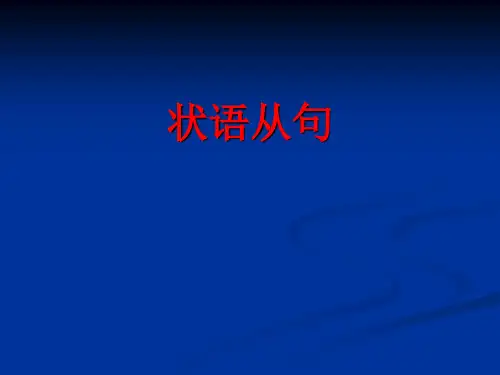

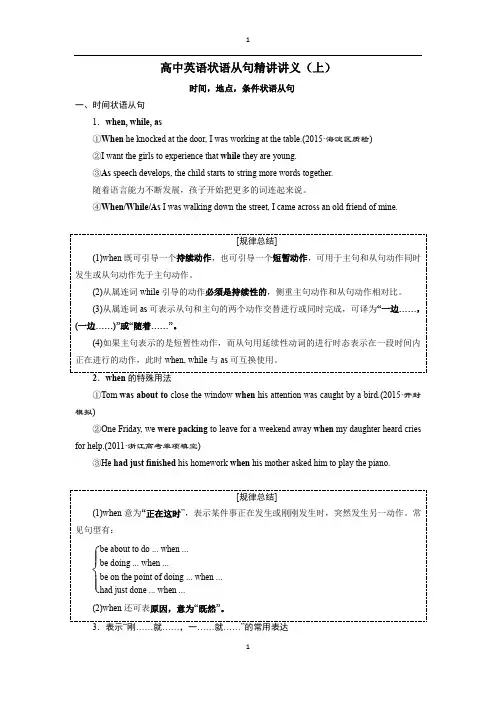
高中英语状语从句精讲讲义(上)时间,地点,条件状语从句一、时间状语从句1.when, while, as①When he knocked at the door, I was working at the table.(2015·海淀区质检)②I want the girls to experience that while they are young.③As speech develops, the child starts to string more words together.随着语言能力不断发展,孩子开始把更多的词连起来说。
④When/While/As I was walking down the street, I came across an old friend of mine.[规律总结](1)when 既可引导一个持续动作,也可引导一个短暂动作,可用于主句和从句动作同时发生或从句动作先于主句动作。
(2)从属连词while 引导的动作必须是持续性的,侧重主句动作和从句动作相对比。
(3)从属连词as 可表示从句和主句的两个动作交替进行或同时完成,可译为“一边……,(一边……)”或“随着……”。
(4)如果主句表示的是短暂性动作,而从句用延续性动词的进行时态表示在一段时间内正在进行的动作,此时when, while 与as 可互换使用。
2.when 的特殊用法①Tom was about to close the window when his attention was caught by a bird.(2015·开封模拟)②One Friday, we were packing to leave for a weekend away when my daughter heard cries for help.(2011·浙江高考单项填空)③He had just finished his homework when his mother asked him to play the piano.[规律总结](1)when 意为“正在这时”,表示某件事正在发生或刚刚发生时,突然发生另一动作。
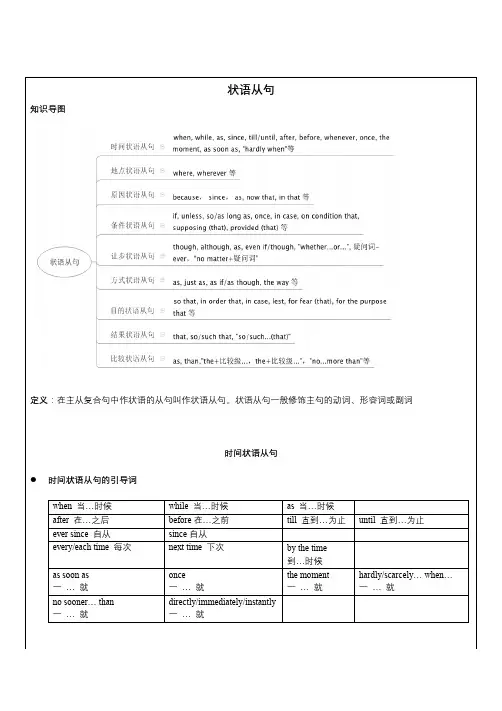
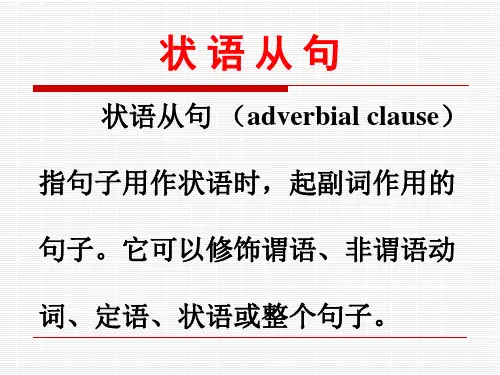
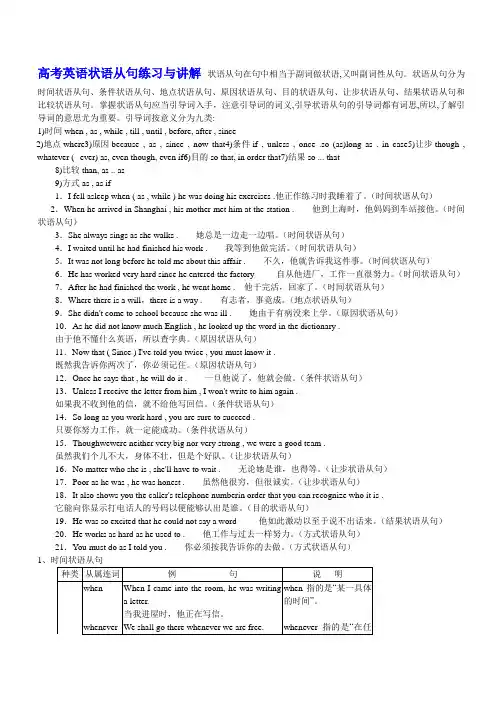
高考英语状语从句练习与讲解状语从句在句中相当于副词做状语,又叫副词性从句。
状语从句分为时间状语从句、条件状语从句、地点状语从句、原因状语从句、目的状语从句、让步状语从句、结果状语从句和比较状语从句。
掌握状语从句应当引导词入手,注意引导词的词义,引导状语从句的引导词都有词思,所以,了解引导词的意思尤为重要。
引导词按意义分为九类:1)时间when , as , while , till , until , before, after , since2)地点where3)原因because , as , since , now that4)条件if , unless , once .so (as)long as . in case5)让步though , whatever (--ever) as, even though, even if6)目的so that, in order that7)结果so ... that8)比较than, as .. as9)方式as , as if1.I fell asleep when ( as , while ) he was doing his exercises .他正作练习时我睡着了。
(时间状语从句)2.When he arrived in Shanghai , his mother met him at the station .他到上海时,他妈妈到车站接他。
(时间状语从句)3.She always sings as she walks .她总是一边走一边唱。
(时间状语从句)4.I waited until he had finished his work .我等到他做完活。
(时间状语从句)5.It was not long before he told me about this affair .不久,他就告诉我这件事。
(时间状语从句)6.He has worked very hard since he entered the factory 自从他进厂,工作一直很努力。
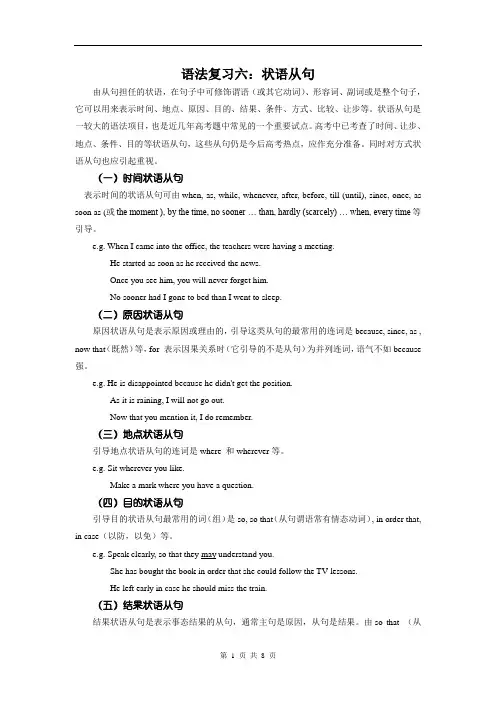
语法复习六:状语从句由从句担任的状语,在句子中可修饰谓语(或其它动词)、形容词、副词或是整个句子,它可以用来表示时间、地点、原因、目的、结果、条件、方式、比较、让步等。
状语从句是一较大的语法项目,也是近几年高考题中常见的一个重要试点。
高考中已考查了时间、让步、地点、条件、目的等状语从句,这些从句仍是今后高考热点,应作充分准备。
同时对方式状语从句也应引起重视。
(一)时间状语从句表示时间的状语从句可由when, as, while, whenever, after, before, till (until), since, once, as soon as (或the moment ), by the time, no sooner … than, hardly (scarcely) … when, every time等引导。
e.g. When I came into the office, the teachers were having a meeting.He started as soon as he received the news.Once you see him, you will never forget him.No sooner had I gone to bed than I went to sleep.(二)原因状语从句原因状语从句是表示原因或理由的,引导这类从句的最常用的连词是because, since, as , now that(既然)等,for 表示因果关系时(它引导的不是从句)为并列连词,语气不如because 强。
e.g. He is disappointed because he didn't get the position.As it is raining, I will not go out.Now that you mention it, I do remember.(三)地点状语从句引导地点状语从句的连词是where 和wherever等。
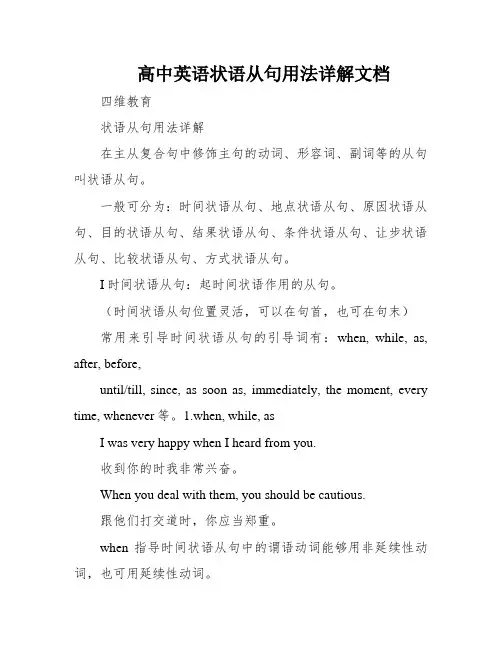
高中英语状语从句用法详解文档四维教育状语从句用法详解在主从复合句中修饰主句的动词、形容词、副词等的从句叫状语从句。
一般可分为:时间状语从句、地点状语从句、原因状语从句、目的状语从句、结果状语从句、条件状语从句、让步状语从句、比较状语从句、方式状语从句。
I时间状语从句:起时间状语作用的从句。
(时间状语从句位置灵活,可以在句首,也可在句末)常用来引导时间状语从句的引导词有:when, while, as, after, before,until/till, since, as soon as, immediately, the moment, every time, whenever等。
1.when, while, asI was very happy when I heard from you.收到你的时我非常兴奋。
When you deal with them, you should be cautious.跟他们打交道时,你应当郑重。
when指导时间状语从句中的谓语动词能够用非延续性动词,也可用延续性动词。
When I was young, I went to town myself.当我还年青时,我本人独自去城里。
(延续性动词)When I lived in country, I used to carry some water for him.我住在农村时,常常为他担水。
(延续性动词)When he received the letter, he'll tell us.当他接到后,他会告诉我们的。
(非延续性动词)When the fire broke out, all the students were sleeping soundly.火灾发生时,所有的学生正在熟睡。
(非延续性动词)注意:当when引导的时间状语从句为系表结构,而且其主语和主句的主语一致,其表语又是一个名词时,就能够用由as指导的省略句来代替when指导的从句。
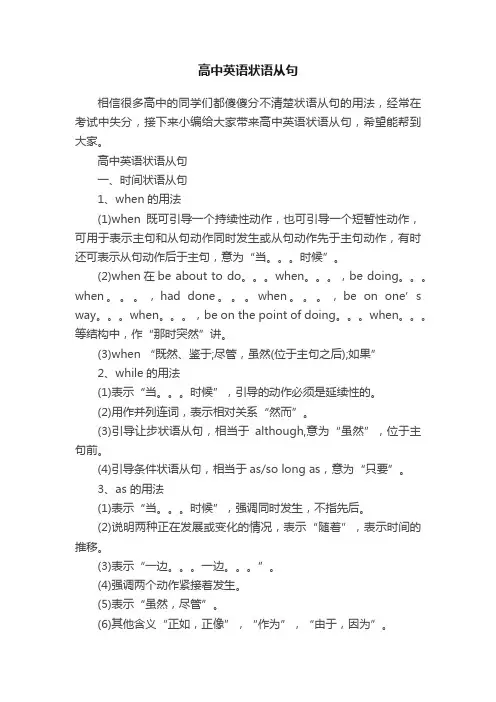
高中英语状语从句相信很多高中的同学们都傻傻分不清楚状语从句的用法,经常在考试中失分,接下来小编给大家带来高中英语状语从句,希望能帮到大家。
高中英语状语从句一、时间状语从句1、when的用法(1)when既可引导一个持续性动作,也可引导一个短暂性动作,可用于表示主句和从句动作同时发生或从句动作先于主句动作,有时还可表示从句动作后于主句,意为“当。
时候”。
(2)when在be about to do。
when。
,be doing。
when。
,had done。
when。
,be on one’s way。
when。
,be on the point of doing。
when。
等结构中,作“那时突然”讲。
(3)when “既然、鉴于;尽管,虽然(位于主句之后);如果”2、while的用法(1)表示“当。
时候”,引导的动作必须是延续性的。
(2)用作并列连词,表示相对关系“然而”。
(3)引导让步状语从句,相当于although,意为“虽然”,位于主句前。
(4)引导条件状语从句,相当于as/so long as,意为“只要”。
3、as 的用法(1)表示“当。
时候”,强调同时发生,不指先后。
(2)说明两种正在发展或变化的情况,表示“随着”,表示时间的推移。
(3)表示“一边。
一边。
”。
(4)强调两个动作紧接着发生。
(5)表示“虽然,尽管”。
(6)其他含义“正如,正像”,“作为”,“由于,因为”。
4、before的用法(1)一般意为“在。
之前”“。
才”,“。
就”“还没有。
”“免得”“不知不觉”“宁可,宁愿”,“否则,要不然”。
(2)It + will be/was + 时间段+before+一般现在时/一般过去时。
在肯定句中,意为“多长时间之后才”;在否定句中,意为“用不了多长时间就”。
5、until和till(1)与肯定句连用,必须是延续性动词。
(2)与否定句连用,必须是非延续性动词,表示“直到。
才,在。
之前不。

高中英语语法:状语从句知识点状语从句(adverbial clause)在句中作状语,可修饰主句中的动词、形容词和副词等。
状语从句由从属连词引导。
状语从句可放在句首或句末。
放在句首时,从句后面常用逗号;放在句末时,从句前面往往不用逗号。
状语从句根据它们的含义分为时间、地点、原因、目的、结果、方式、让步、条件、比较等九种。
一、时间状语从句1、while, when, whenever和as的用法比较(1)while常表示一段较长的时间或一个过程,强调主句的动词和从句的动词所表示的动作或状态是同时发生的。
它不能表示一时性或短暂的动作。
Don't talk so loud while( as) others are working.别人工作时,请勿大声说话。
(2)when引导的时间状语从句,可指时间的一点,也可以指一段时间,从句的谓语动词可用终止性动词,也可用持续性动词。
when引导的从句表示的具体的时间,从句的动作和主句的动作可以同时,也可以先于主句的动作。
Whenever指任何一个不具体的时间。
It was raining when we arrived. 我们到达时,天正下着雨。
(动作同时,指时间点)When you read the poem a second time, the meaning will become clearer to you.当你再读一遍这首诗,你就更清晰它的含意。
(动作有先后,指时间点,不能用while)Come whenever you like. 你爱什么时候来就什么时候来。
(3)as用as时主句和从句的动作往往同时发生,具有延伸意义,一般同延续性动词连用,有时可译作“一边…一边…”。
As time went on, his theory proved to be correct.随着时间的推移,他的理论被证明是正确的。
As(when)he finished the speech, the audience burst into applause.他讲话结束的时候,听众掌声雷动。
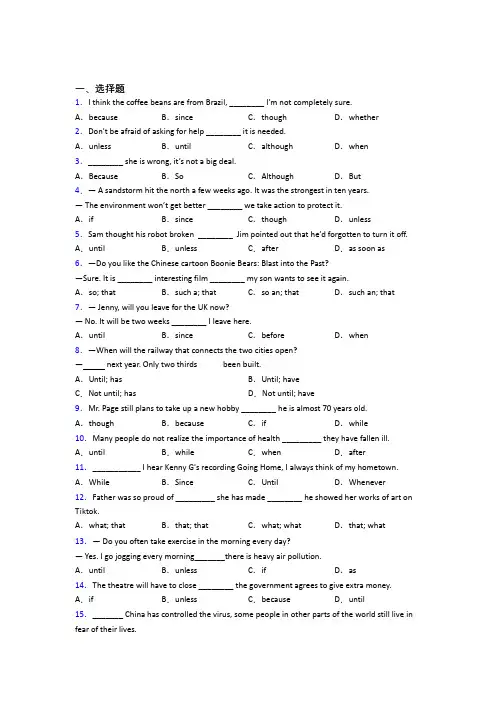
一、选择题1.I think the coffee beans are from Brazil, ________ I’m not completely sure.A.because B.since C.though D.whether 2.Don't be afraid of asking for help ________ it is needed.A.unless B.until C.although D.when3.________ she is wrong, it’s not a bi g deal.A.Because B.So C.Although D.But4.— A sandstorm hit the north a few weeks ago. It was the strongest in ten years.—The environment won’t get better ________ we take action to protect it.A.if B.since C.though D.unless5.Sam thought his robot broke n ________ Jim pointed out that he’d forgotten to turn it off. A.until B.unless C.after D.as soon as 6.—Do you like the Chinese cartoon Boonie Bears: Blast into the Past?—Sure. It is ________ interesting film ________ my son wants to see it again.A.so; that B.such a; that C.so an; that D.such an; that 7.— Jenny, will you leave for the UK now?— No. It will be two weeks ________ I leave here.A.until B.since C.before D.when 8.—When will the railway that connects the two cities open?— next year. Only two thirds been built.A.Until; has B.Until; haveC.Not until; has D.Not until; have9.Mr. Page still plans to take up a new hobby ________ he is almost 70 years old. A.though B.because C.if D.while 10.Many people do not realize the importance of health _________ they have fallen ill. A.until B.while C.when D.after11.___________ I hear Kenny G's recording Going Home, I always think of my hometown. A.While B.Since C.Until D.Whenever 12.Father was so proud of _________ she has made ________ he showed her works of art on Tiktok.A.what; that B.that; that C.what; what D.that; what 13.— Do you often take exercise in the morning every day?— Yes. I go jogging every morning_______there is heavy air pollution.A.until B.unless C.if D.as14.The theatre will have to close ________ the government agrees to give extra money. A.if B.unless C.because D.until15._______ China has controlled the virus, some people in other parts of the world still live in fear of their lives.A.While B.Although C.Unless D.Until16.—_________ I have tried many times, I can't work it out.—Don't give up and let's have another try together.A.Since B.Because C.Unless D.Though17.It’s almost three years ________we saw each other last time.A.since B.after C.when D.before 18.—Mike, can you tell me how to speak in an online class?—Sure, click on this icon you start to speak.A.after B.until C.before D.since 19.Benny, monitor of our class, is such ________ honest boy that we all trust him.A.a B.an C.the D./20.I'm sure you can catch up with others _______ you work hard.A.until B.if C.unless D.though 21.—More and more people like shopping online now.—I agree. My sister will be crazy about it ________ my parents give her enough money.A.if B.unless C.when D.while22.Dr. Smith will never leave his parents ________ he is sure both of them are taken good care of.A.since B.though C.if D.unless23.It’s sad to hear that 19 people lost their lives ________ they were fighting with the forest fire in Liangshan, Sichuan.A.as soon as B.after C.while D.until24.Plenty of ideas were considered________the artist decided on the design of the sculpture. A.before B.so C.unless D.because 25.The old couple insist on living in a small village among the mountains __________ they can get closer to nature.A.until B.unless C.even though D.so that 26.—Lucy, you can come to me for help ________ you get into trouble in your study at school.—Thanks, David. You are always helpful.A.although B.unless C.when D.since27.—I hear you are going to visit Disneyland next month. May I go there with you?—I’m afraid not, ________ you have a ticket.A.if B.unless C.until D.as soon as 28.You should say it louder ________ everyone can hear you.A.in order B.to C.so that D.in order to 29.—We will go out for a picnic as we planned ________ it rains tomorrow.—You needn’t worry about the weather. It’s sunny tomorrow.A.until B.unless C.if D.when30.— Why did your mother get ________ with you just now?—Because I made ________ many mistakes in the exam that she ________ controlled herfeelings when she heard it.A.satisfied; so; really B.satisfied; such; nearlyC.angry; so; hardly D.angry; such; mainly31.—Did you watch the Football League yesterday?—Yes, of course. I never miss it ________ I am too busy with my homework.A.unless B.until C.if D.since 32.Grade 9 students should keep exercising ________ they are busy with so many subjects. A.if B.until C.though D.because33._______ she is wrong, it’s not a big deal.A.Because B.So C.Although D.But34.I go jogging every morning, ________ it is very hot outside.A.so B.but C.although D.because 35.—Did you stay at the party for a long time last night?—Yes. I stayed there ________ the party was over.A.until B.since C.when D.if36.________ it has a long history, time hasn’t stopped the Forbidden City from trying to build bridges with young people through cultural products.A.Unless B.Because C.Although D.Since37.At present,it is not easy for some students to get up early ________ they have too much homework to finish.A.unless B.since C.as a result D.although38.________ Jane couldn’t see his face, she could tell by his voice that he was a middle-aged man.A.Unless B.Although C.If D.Until39.________ more and more people surf the Internet for news, the traditional newspaper may not disappear in a short time.A.Because B.If C.Though D.When40.Mr. Wang, can I go to play football with my classmates ________ school is over?A.as soon as B.as well as C.as good as D.as many as 41.Suzy, you will achieve nothing ________ you devote yourself to your study.A.after B.though C.because D.unless42.Her job is not up to the boss's standard ________ she has worked at it for a week. A.since B.although C.if D.unless43.Your parents love you so much ________ they seldom say, “I love you”.A.unless B.that C.because D.although 44.You will never grow ________ you try to do something beyond your abilities.A.when B.since C.though D.unless 45.—What is our head teacher like?—Oh, he is very kind ________ he looks very serious.A.because B.though C.if D.when46.________ I have solved it, you can't imagine how much difficulty I faced.A.Because B.Although C.Unless D.When47._______ the outbreak of COVID-19 is a terrible blow to the country, the government is trying hard to bring the situation under control.A.Although B.If C.Unless D.However48.In summer, milk quickly goes bad ________ it is put into a fridge.A.though B.unless C.because D.once49.________ more and more people surf the Internet for news, the traditional newspaper may not disappear in a short time.A.Because B.Since C.Though D.Unless 50.Protecting wildlife is without doubt an important part, ________ each animal on Earth has a role to play in the ecosystem.A.since B.though C.unless D.if【参考答案】***试卷处理标记,请不要删除一、选择题1.C【详解】句意:我想咖啡豆是巴西产的,不过我不太确定。
状语从句一.分类:adv.+that(如此……以致)so that(结果……)such+n.+that(如果……以致)that(所以,因此)让步状语从句:though/although不可同but连用。
though/although (虽然)however (可是)even though/if(即使)no matter+what/which/where/who/when=whatever/whichever/wherever/whoever/whenever(不论什么/哪一个/哪里/谁/何时)比较状语从句:as (正如)as…as(和……一样)not as/so … as (不如……)than(比……更)the+比较级…+the+比较级(越……越……)条件状语从句:if(假设)unless(如果不)so long as(只要)on condition that (如果)方式状语从句:as(像……那样地)just as(正像)as if(好像)as though(好像)二.各种状语从句的简化方法:1after/before+doing sth.作状语。
例:After she sang,she left the rich man's house.= After singing,she left the rich man's house.2.以as soon as引导的状语从句的主语若与主句主语一致时,从句等于on+doing sth.,作状语,此时的动词为非延续性动词。
例:Mary began to operate on the wounded soldiers as soon as he arrived at the village.= Mary began to operate on the wounded soldiers on arriving at the village.3.时间状语从句和条件状语从句的主语和主句主语一致时,有时可简化为不定式作状语。
状语从句●定义:用“引导词+述语序”作状语●状语:修饰动作,把句子“壮大”He speaks English well.(方式状语)The sun rises in the east and sets in the west.(地点状语)●九种状语从句:时间、地点、原因、结果、方式、目的、条件、让步、比较I love you you love me(1)when—时间状语(2)where—地点状语(3)because—原因状语(4)so—结果状语(5)as—方式状语(6)in order that—目的状语(7) I will love you if you love me.—条件状语(8) I won’t love you even if you love me.—让步状语(9)more than—比较状语意思不同,形式不同,形意相关I read English loudly in the open air every morning.方式状语地点状语时间状语用从句形式当状语,即状语从句(一)时间状语从句引导词●till, untilA until B:A一直延续到B出现或发生就停止I slept until noon.I didn’t go to bed until midnight.I entered the room until 6:30.I didn’t enter the room until 6:30.as soon as,the minute, the moment, the instant, immediately, directlyno sooner…than, hardly…when, scarcely…when(结合倒装句)●before, after, 完成+since(自从)+过去时间--what was the party like?--Wonderful. It’s years I enjoyed myself so much.A. afterB. beforeC. whenD. sinceIt is 50 years the PRC was founded.A. afterB. beforeC. whenD. sinceI knew Mr. Green I knew Mrs. Green.A. long beforeB. before long过不了多久C. long agoD. after long●when, while, as(当)(1)while持续性动作或状态D on’t laugh while you are praying.(2)as伴随或较短的时间As I was speaking, some of you were sleeping.Mother was worried because little Alice was ill, especially father was away in France.A. asB. thatC. during介词,后面只能跟名词D. if(3)when当…时/正在这时,突然…/正要做某事,突然…When I was young, I listened to the radio.I was doing my homework when the earthquake happened.I was about to do my homework…Why do you want a new job you got such a good one already?A. thatB. whereC. whichD. whenhis plane arrived at the airport in Paris, I had already left for Los Angeles.A. WhileB. UntilC. WhenD. AsIt just isn’t fair. I was working as a waiter last month, my friends were lying on the beach.A. WheneverB. thoughC. forD. while延续的感觉(二)其他状语从句●whereAfter the war, a new school building was put up there had once been a theatre.A. thatB. whereC. whichD. when●because, since, asIt was he was ill that he didn’t go with us.A. since既然B. for为推断找解释C. as由于D. because直接原因或根本原因It must have rained last night, the ground is wet this morning.A. forB. sinceC. becauseD. asThe ground is wet, because it rained last night.He must be ill, he looks so pale.A. sinceB. becauseC. asD. for_____ you are free tonight, why not drop in and play chess with me?A. ForB. Since既然C. BecauseD. Even if●so…that…/ such…that如此…以致于Father was busy in working he often forget rest or meals.A. very, thatB. so, thatC. such, asD. enough, as●as(以…方式),as if/ as thoughShe doesn’t speak her friend, but her written work is excellent.A. as well asB. so often asC. so much asD. as good as●unless=if +notYou will be late you leave immediately.A. unlessB. untilC. ifD. or●though, although, even if, even thoughwhile(虽然,而)whatever, whoever, wherever, whenever, however, whicheveras(尽管)thanAlthough he is a man, he likes skirts. = Man as he is, …Try he might, he couldn’t get out of difficulty.A. whenB. whereC. tillD. as, he can never solve the problem alone.A. Clever and intelligent he isB. Clever and intelligent as he isC. As he is clever and intelligentD. As clever and intelligent he is, mother will wait for him to have dinner together.A. However late is heB. However he is lateC. However is he lateD. However late he is●now that(既然), in that(因为)●so that, in order that●lest, in case, for fear that(以防)if, as/ so long as, onceThe volleyball match will be put off if it .A. will rainB. rainsC. rainedD. is rainingThe new secretary is supposed to report to the manager as soon as she .A. will arriveB. arrivesC. is arrivingD. is going to arriveRemember to send me a photo of your son next time you to me.A. writeB. will writeC. are writingD. would write。
高考英语语法复习状语从句知识讲解一、概述常见的有although/though/even though引导的让步状语从句。
if/unless引导的条件状语从句。
until/when/while/as soon as引导的时间状语从句。
because引导的原因状语从句,so that引导的目的状语从句等。
if引导的条件状语从句和when引导的时间状语从句一般都会和时态相结合,即主要考查“主将从现”原则。
对于状语从句的学习可与专题六从属连词相结合。
在时间状语从句和条件状语从句中,主句和从句的时态一致问题一般有两种情况:(1)“主将从现”:主句用一般将来时,而从句用一般现在时。
常见的使用“主将从现”原则的连词有:表示时间的when, while, after, before, until, till, whenever, as soon as, as long as, once 等;表示条件的if, unless, so long as, in case等。
(2)“主祈从现”:若主句是祈使句,或主句中有情态动词时,那么从句用一般现在时表示将来。
(3)“主情从现”:若主句有情态动词, 那么从句用一般现在时表示将来。
如:You can get good grades if you study hard.如果你努力学习,你将取得好成绩。
状语从句由从属连词引导,与主句连接,位于句首时,常用逗号与主句分开,位于句末时,其前一般不用逗号。
状语从句根据其用途可分为时间状语从句、条件状语从句、原因状语从句、目的状语从句、结果状语从句、让步状语从句、比较状语从句、地点状语从句等。
二、时间状语从句(1)当主句是一般将来时态或祈使句,表示将来的意义时,从句通常用一般现在时,简称“主将从现”。
I’ll ring you up as soon as I get to Beijing.我一到北京就给你打电话。
(2) when引导的时间状语从句,通常表示主句和从句的动作同时发生;before表示主句的动作发生在从句的动作之前;after则表示主句的动作发生在从句的动作之后;as引导时间状语从句时,往往表示主句和从句的动作同时发生,不分先后。
Adverbial Clauses (状语从句)状语从句在句中作状语,修饰主句中的动词、形容词或副词等。
状语从句放在主句之前时,常用逗号分开;放在主句之后,一般不用逗号。
状语从句按其意义和作用可分为时间、条件、原因、让步、目的、结果、方式、比较、地点等9种。
1.时间状语从句(adverbial clause of time)⑪时间状语从句常用连词有when,as,while,before,after,since,till(until),as soon as,hardly …when …,no so oner …than,the moment等。
⑫主句若为一般将来时(will\shall\can或祈使句),从句要用一般现在时或现在完成时。
①I'll go on with the work when I come back tomorrow. 我明天回来的时候继续干。
②Please tell him about it when you see him back. 你看到他回来,就告诉他这件事。
⑬连词when,while,as都表示“当……的时候”,但有区别。
※When引导的从句中的动词,既可以是延续性动词,也可是非延续性动词。
①When my father came in , I was doing my homework.②John arrived when I was cooking lunch.如果主句和从句的动作是一先一后发生的,只能使用when,先发生的动作要用完成时③When I got to the station, the train had left.※While 从句表示一段时间的动作或状态,从句动词必须是延续性动词。
④He entered the room while I was reading a book.⑤I was cooking/cooked the dinner while I was listening/listened to the piano.※当主句动作发生在从句动作过程中,且从句动作为延续性动词时,可用as,相当于When\while。